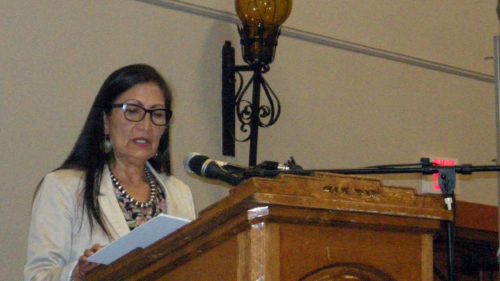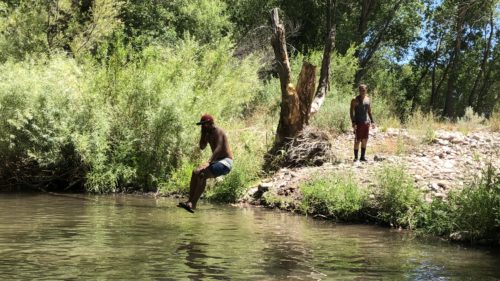By BEN NEARY
NMWF Conservation Director
ALBUQUERQUE — Hunters, anglers and trappers need to police their own ranks and realize that everything they do will be increasingly scrutinized in these days of widespread social media, the head of the New Mexico State Game Commission says.
Joanna Prukop, appointed this year as the first woman to chair the game commission, spoke this week at an event organized by the New Mexico Wildlife Federation. Her talk focused on the importance of following the precepts of the North American Model of Wildlife Management.
The model has seven general tenets:
1. Wildlife Resources Are a Public Trust;
2. Markets for Game Are Eliminated;
3. Allocation of Wildlife Is by Law;
4. Wildlife Can Be Killed Only for a Legitimate Purpose;
5. Wildlife Is Considered an International Resource;
6. Science Is the Proper Tool to Discharge Wildlife Policy;
7. Democracy of Hunting Is Standard.
The tenets derived from the teachings and observations of generations of American conservationists. They came together recently under the heading “North American Model,” largely as a result of the scholarship of Canadian biologists Valerius Geist and Shane Mahoney.
Prukop, a longtime wildlife manager, has authored articles for professional wildlife management publications on the importance of the North American Model.
Prukop served 25 years with the New Mexico Department of Game and Fish and also worked as director of the New Mexico Department of Energy, Minerals and Natural Resources. Most recently, she served in President Barack Obama’s administration as a three-term appointee to the Wildlife and Hunting Heritage Conservation Council. She holds a master’s degree in wildlife biology from Colorado State University.
Speaking at Marble Brewery’s Northeast Height’s location on Aug. 14, Prukop said the public trust doctrine is one of the key elements of the North American Model. The doctrine holds that wildlife, fish and waterways aren’t owned by individual landowners, but rather that the government holds them in trust for the public.
“It’s what our forefathers, the pilgrims and others who came to this country put in place because of what they fled when they left Europe,” Prukop said of the public trust doctrine.
Under the European system, “the monarchies controlled wildlife, and the public’s access to it,” Prukop said. “As you know, if you poached on the king’s land, if you didn’t get hanged for it you lost your hand, or something very awful happened to you. Our forefathers knew that’s not the way we were going to do things here so the public trust doctrine, which goes back to its foundations in Greek philosophy and Roman law and then also the Magna Carta, became a cornerstone of the way we do things here.”
The elimination of market hunting came after several species such as the bison, passenger pigeon and lots of song birds were hunted to extinction or near extinction, Prukop said.
“Also, it’s true that deer and other cervid herds were hunted pretty hard,” Prukop said. “And it became apparent that something needed to be done to protect our wildlife herds in the country, so elimination of markets was one of the first things that leaders at the time looked at and acted on. So that’s an important precept as well.”
The precept that wildlife should only be killed for a legitimate purpose continues to stir debate, in some circles, Prukop said.
“This is where we talk about things like, ‘you should eat what you kill,’ and this particular precept is still controversial today as you know because of trophy hunting, importing exotics from African countries and other places in the world, whether or not we should have trophy polar bear hunts, that kind of thing,” Prukop said. “So legitimate purpose is something that I feel game commissions are still dealing with today.”
The precept that wildlife is an international resource becomes important in regard to whales, waterfowl and other species, Prukop said.
The precept of the importance of democracy of hunting is something that our forefathers wanted rooted strongly in the country, Prukop said. “That is, everybody should have access to wildlife, whether that’s hunting, angling or trapping, or else just viewing and nonconsumptive uses of wildlife,” she said. “That precept is still very important today, especially when you read some of the readings about the people who are still very much trying to figure out how to bring the North American model into this century in a meaningful way. That precept is also discussed when you think about the anti-hunting community and their desire to limit or eliminate many publics’ access to wildlife, that precept comes into those discussions.”
If hunters and anglers themselves fail to follow the precepts of the North American Model in some of their activities, Prukop said it endangers the future of their sports.
“Coyote-calling contests, well you might as well add rattlesnake roundups, and in the East it’s crow-killing contests — all of those in today’s modern, socially active world reflect badly on legitimate hunting, and regulated hunting,” Prukop said. “I always ask hunters to think about that.”
The New Mexico Legislature this year outlawed coyote-calling contests, in which contestants competed to kill coyotes for cash prizes. The New Mexico Wildlife Federation supported the ban on the grounds that such contests violate the North American Model.
Prukop said the fact the New Mexico Legislature had to act on coyote contests is, “an example of what we as a hunting community and an angling community and a trapping community really don’t want to have happen. We do not want wildlife management legislated. We should be using science and biologists and management systems to do it. So the North American model still is very relevant in that regard.”
Prukop and the other newly appointed game commissioners have been moving recently to roll back regulations the previous commission promulgated that allow the sport trapping of mountain lions.
“Sport trapping of lions is something that I’m sorry was ever implemented and I think it’s harmful to the image of hunting and our ability to hunt going into the future,” Prukop said.
Promoting regulated ethical hunting for future generations requires knowing the demographics of the population, Prukop said. It also will require showing respect for all wildlife species, she said.
“It means broadening the North American Model to include all wildlife, not just hunted, fished and trapped species. And for many years, the model sort of fell down in that area, it was seen as a model only for the consumptive use of wildlife and it was focused on big game animals,” Prukop said. “We in this century have to definitely shift that so that all publics are concerned about what we do, so that we can hopefully in our state also secure alternative sources of funding for a wide array of wildlife.”
Taking on the responsibility of managing more species will require the New Mexico Department of Game and Fish to receive adequate funding for the job, Prukop said. “One of the things I’m concerned about is creating unrealistic expectations for the department by not having the ability to implement whatever the Legislature might hand us,” she said. “And we will need money to do that, and it can not be hunter or angler or trapper dollars. It has to come from some other source.”
Prukop said the days of the “good ol’ boys” calling all the shots on wildlife management are gone. “We have too much social media and too many publics that are not consumptive users who would like to tell us how to manage wildlife,” she said.
Anytime hunters, anglers and trappers fight among themselves it hands arguments to those who would ban all consumptive uses of wildlife, Prukop said.
“And so, just be careful,” Prukop said. “I”m just urging you to be thoughtful and reflect on the model in terms of how we go forward to do things because my overall goal is to protect our privilege of hunting, angling and trapping and we just have to be very thoughtful about how we do that. We need to think magnanimously about how we work together among ourselves and with all those other groups interested in wildlife who hopefully we can get to at least not necessarily join us but accept us as a legitimate activity today and going forward.”



